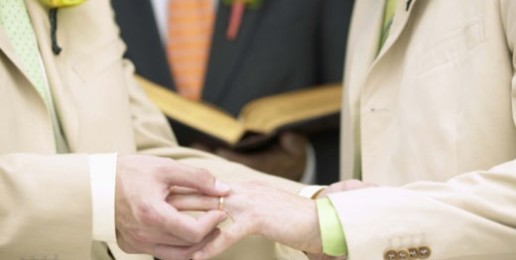
I don’t know why the question of whether Christians should attend the “same-sex marriage” ceremonies of family members, friends, or colleagues is such a stumper for Christians. Although the decision not to attend may be fraught with uncomfortable social implications, it shouldn’t be a thorny theological or moral question.
If we understand God’s view of homosexuality and marriage rightly and if we understand that as Christians, our first obligation is to submit our lives to him who gave his life for us, we cannot attend a ceremony that intends to solemnize, sanctify, and celebrate that which God abhors.
Many people, including even those who aren’t Christians, tell us that unity and comity trump truth and that respecting others requires affirmation of all beliefs and all life choices–at least when it comes to sexuality.
But our chief goal should not be to please people at the expense of biblical truth. Our chief end is to glorify God–not man.
Dr. Al Mohler, president of Southern Baptist Theological Seminary, offers a succinct answer to this important question:
Would you attend a same-sex wedding ceremony? That question was posed recently to Houston pastor Joel Osteen, and Osteen said that he would attend, if the wedding involved friends. This came just after Osteen indicated that he could not perform a same-sex marriage ceremony, since he believes that homosexuality is a sin.
I recently wrote about this exchange, suggesting that Osteen’s position is morally and theologically incoherent. As I said: “This is beyond mere incoherence. It is moral and theological nonsense. More than that, it is a massive statement of ministerial malpractice. . . . You cannot celebrate what you say you know to be sin. You cannot honestly say that same-sex marriage defies the law of God, and then join in the celebration of that ceremony.”
In recent days, Uri Scaramanga of “Out of Ur” and Leadership magazine posed the question to readers, using my comments as a point of reference. The question: “Is Al Mohler right? Is attending a same-sex marriage ceremony the same as performing one? Is it ministerial malpractice? What would you do?”
The responses to that question are revealing. I did not, however, argue that attending a same-sex marriage ceremony is the same as performing one. I did say–and I repeat–that it is incoherent and inconsistent to refuse to perform a same-sex marriage ceremony, and then to attend one.
The reason for this is deeply rooted in the nature and history of the wedding ceremony. The presence of witnesses at a marriage ceremony affirms the righteous nature of the union. The ceremony then becomes an occasion of shared joy and celebration.
The traditional Christian ceremony, as reflected in The Book of Common Prayer, asks if anyone present knows of any reason why the couple should not be joined in holy matrimony. That is not intended as a hypothetical question. It is intended to ensure that no one present knows of any reason that the union should not be solemnized, recognized, and celebrated.
To put the matter straightforwardly, any Christian who knows that same-sex marriage violates God’s Law and purpose for marriage knows–and cannot act as if he or she does not know–that a same-sex couple should not be joined in holy matrimony. To remain silent at that point is to abdicate theological and biblical responsibility. Even if the question is not formally asked in the ceremony, the issue remains. We cannot celebrate what we know to be wrong.
Given time, no church, no family, and no individual Christian will escape this question. This will lead, unquestionably, to hard decisions and awkward situations. The time to think about this question is now.
I will pose the question just as it is posed at “Out of Ur” by Uri Scaramanga: What would you do?

























